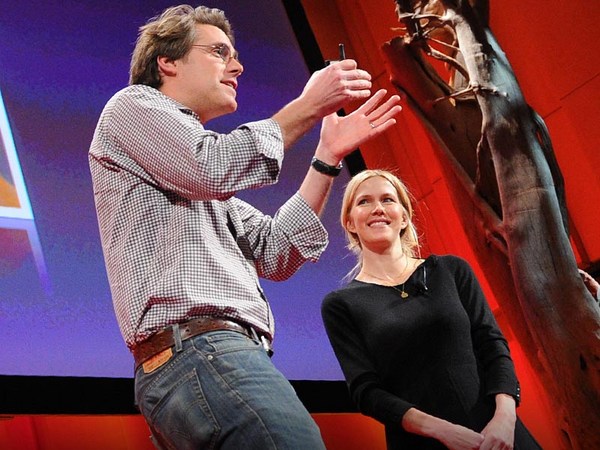I remember the day. My wife was three months pregnant, and I knew that I wanted to take time off. But when I walked in to ask my boss, I was so nervous. I was about to ask for seven months of paternity leave, and I just didn’t know how my boss would react to that.
[The Way We Work]
Like most men in Japan, I grew up being told that masculinity is supposed to look a certain way. You’re supposed to be stoic and strong, dominant and in control; the breadwinner for your family. But when I met my wife, she challenged me on that. She pushed me on thinking that men should always pay for dates and assuming that women should always do the childcare.
Japan offers both mothers and fathers 12 months of paid parental leave. It’s been ranked number one in the world in terms of length and compensation for paternity leave. But here’s the crazy thing. In 2020, only about seven percent of fathers took it. And of that seven percent, three quarters took a leave of two weeks or less. With pressure at work, most Japanese men just aren’t at home during this pivotal time. And that’s a shame, because paternity leave -- it benefits everyone. Here is why normalizing it is so important.
I believe deeply in gender equality. I took my wife’s last name and even wrote a book about it, and still I was terrified asking for paternity leave. I'd heard of bosses denying the request or questioning their employees’ masculinity. I was scared that in asking for time off, I might be replaced or left behind. But my boss -- he accepted my request right away, which made me feel so valued, and he let me focus on what was important: my family.
I can’t describe how much joy I got seeing my newborn son each day. I especially loved my early morning shift with him so his mom could sleep in. When he was a newborn, we’d just cuddle on the couch, but when he got a little bigger, he became my best workout buddy as a cheerleader during my morning runs in his stroller or as a human dumbbell for squats and biceps curls.
I feel so close to my son now. And it’s not just me. Men who take paternity leave experience a stronger bond with their babies. Research shows that the longer the paternity leave, the more engaged the father is in the first few years of a child’s life. I was shocked to learn that over half of all US fathers report feeling dissatisfied with the amount of time they spend with their children. Paternity leave is a chance to change that.
My relationship with my wife also deepened on my leave. We went on a walk together every day, and I became a better cook and cleaner because I was able to spend more time on household duties, which made her happy.
In a McKinsey and Company survey, 90 percent of fathers who took paternity leave said it improved their relationship, too. This happens along a few different dimensions. First, because you gain a whole new respect for what’s involved in childcare and housework, and it makes you step up and take on more. And by being home, you’re providing emotional support. Statistics show that when a mother’s partner is involved, especially in the first few weeks after birth, it reduces the risk of postpartum depression significantly.
But this is really just the start, because paternity leave is also good for business. Paternity leave can have a profound impact on gender equality in the workforce. There’s an inherent imbalance if women take childcare leave and men don’t. Working mothers are often juggling two full-time jobs: one at work and one at home. Many don't return to the workforce or decide to take reduced roles. By taking paternity leave, men can give women more options and even boost their ability to rise into leadership roles. A study in Sweden showed that for every month of parental leave taken by the father, the mother’s earnings increased by approximately seven percent. It’s interesting to note that 90 percent of female students in Japan say they’d want their future partner to take parental leave, and nearly 80 percent of men entering the workforce here -- and I suspect in other countries, too -- say they want to take paternity leave.
For employers to have that open, inclusive culture where paternity leave is respected, that can help companies attract and retain the best talent. Workers are increasingly choosing the companies based on the culture. This is a space where any company can give themselves a boost.
I’ve been back at my job for about three months now, and I can already tell you I feel so much more productive and very focused and always looking for ways to be more efficient so I can get home to my family. I’ve heard this from many mothers coming back from maternity leave too. And studies confirm: 80 percent of companies that offer paid family leave report a positive impact on morale, and 70 percent notice a boost in productivity. It’s a positive for any company, and that brings me to my final point.
Paternity leave -- it’s good for society. Paternity leave is one of the big steps we can make in giving partners the opportunity to share the work both at home and at work. It’s one of our best bets to bridge the gender gap overall. Research shows that when that gender gap gets smaller, people report higher life satisfaction. Iceland, Norway and Finland ranked top three in the Global Gender Gap Index, and over 70 percent of fathers take paternity leave. And if you take a look at their ranking in the World Happiness Report, they’re very, very high. This might be a coincidence, but ... I don’t think so. That freedom to be yourself and make choices without gender expectations, it feels really good.
We live in a patriarchy. And what I've realized is that the same world that systematically favors men, it's also trapping us in a cage. We need more countries to set up systems that allow all parents to take paid childcare leave To give everyone new options, we need to build a culture that encourages and values men as caretakers, because we can do it too.





